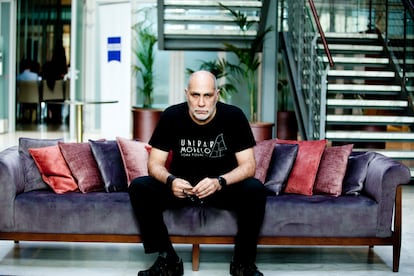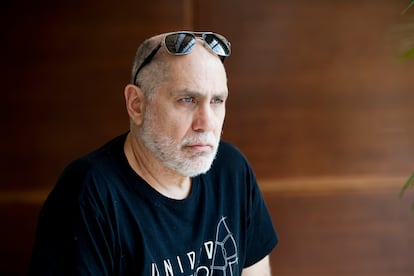Guillermo Arriaga: ‘When I was a kid, I would use a Coca Cola bottle to practice receiving an Oscar’
The Mexican author and screenwriter discusses his new novel ‘Extrañas’ and his passion for writing, which he developed as a child. ‘My life is dedicated to writing’


The writing of Mexico City-born author and screenwriter Guillermo Arriaga, 65, has taken a radical turn. After the overwhelming success of his novels and screenplays, like Amores perros, which paints a stark picture of a savage Mexico City, Arriaga recently published a new novel, Extrañas, a dizzying tale of creatures that are somewhere in between fantastic and real, grotesque and poetic, and the narrative immerses the reader in a world where scientific advances set the pace. The novel is set in England at the end of the 18th century and the main character, young aristocrat William Burton, questions the beliefs and superstitions of his day. Through science, he seeks to gain an understanding of what many consider to be divine decisions. Banished from his wealthy status and disinherited by his father because of his decision to study medicine, Burton decides to break with his own prejudices and fears. To that end, he seeks explanations for seemingly extraordinary facts, such as the existence of human beings who are born deformed or crippled, and creatures that seem supernatural, such as the so-called “strange ones.” Arriaga was nominated for an Oscar for Babel and won the Cannes Film Festival’s Best Writer Award for The Three Burials of Melquiades Estrada. In an interview with EL PAÍS, he discusses his most recent novel, his interest in science and medicine, and his passion for writing, which has made him one of the most widely read authors in Spanish-language literature.
Question. You wrote a novel in which science is the main character. Why did you decide to focus on scientific topics and medicine?
Answer. Originally, I intended for the story to be about the “strange ones,” beings that only appear every 300 years. I didn’t plan to talk about science, but when I got [deeper] into the subject, I realized that in order to get to the “strange ones,” I had to go through science …it is very impactful to meet beings like the “strange ones.” It seemed crucial to me that the explanation at least be as scientific as possible.
Q. What was the process of researching these creatures like?
A. I am not somebody who does a lot of research, but medicine has always interested me. My brother was studying veterinary medicine when I was in high school, and in the afternoons I would go with him to his classes at the university. Then when I did my master’s degree in history, I took courses that were specifically about the history of science. And science has always caught my attention, particularly medicine.
Q. Why did you decide to tell the stories of these creatures, the s”trange ones?”
A. Almost everything I’ve written has always been about personal experience. This story came [to me] out of the blue in the middle of a highway. A friend was driving along, and I turned around and said, “This is [the story] I want to tell.” And he told me I was completely unhinged. That happened 12 years ago. I rarely write a story the moment that it comes to me; I let a lot of time go by to see if it’s really a story worth telling.

Q. William Burton, the novel’s main character, immerses himself in his personal scientific quest to understand the world, but he is also surrounded by a lot of superstition. Do you think people continuously struggle between the rational and the spiritual, or do they need a spiritual element to understand their existence?
A. As a radical atheist who grew up without a religious upbringing, the spiritual is not really a part of life that I personally require. I think I am partial to reason and humanism. If there is one thing we atheists have, it’s that we become much more humanistic and more concerned about the welfare of other people, because instead of looking up, we look other people in the eye, the other person becomes my immediate reality. I believe that when science is not tainted by outside uses, such as political, economic or social purposes — because science can also be manipulated — [but] when pure science is the only interest, if you will, it fascinates me.
Q. In the book, you say that science can only progress if society believes in it, and we are talking about the 18th century there. But look at what has happened in our own day with the pandemic; many people not only questioned the origins of the disease, but also the scientific methods for dealing with it. Why do you think so many people are questioning science and the advances it has made now?
A. As a species, we are really in the very early process of understanding the body. And obviously any decision that affects the body, anything that goes into our body, is going to cause debates. It’s funny how the left supported scientific knowledge, which was vaccines, and the right opposed them. It was truly pathetic. It’s obvious that vaccines were going to have unexpected consequences. You don’t know how each body is going to react. If I’ve learned anything from this novel, it’s that the makeup of a body is far more complex than we imagine. We are not individuals; we are a collection of cells. And how these cells come together and progress is a mystery, even to human beings. During the pandemic, science was politicized.
Q. When you write a novel, at some point in the process, do you think about whether it can be made into a movie?
A. Never. I write a book thinking it’s going to be a book. I never think ‘this could be a great TV show, a great movie,’ because then you are betraying literature itself; you begin to prostitute it and start making concessions, and literature doesn’t tolerate concessions. Neither do dramatic films; you can’t say, “this can be turned into a book, or a comic book, or a play or an opera.” They wanted to turn Amores perros into an opera and make 21 Grams into a comic, but I’m not thinking about creating a film or a book for it to be transformed into another medium.
Q. You have spoken a lot about your childhood, about the violence you experienced in the Mexico City neighborhood where you grew up, where you had to fight as a way to survive. How has that past, those early experiences, influenced your work as an author?
A. It totally shaped me. But luckily it was also mitigated by my family, which was very cultured, very loving, very supportive. It was inconceivable that my parents would ever tell me not to be a writer. On the contrary, they told me to be a writer, to go for it. My father told me that it’s better to be happy in one’s profession and not earn much, than to earn a lot in a profession that will crush your soul. That added nuance to what was happening in the street, but there was also a lot of mutual understanding, a lot of solidarity, a lot of brotherhood in the streets. Fortunately, that violence did not affect me; it didn’t negatively impact me.

Q. But it influenced your stories, because there’s always something dark, always something violent in them.
A. Of course it had an influence. I did have that street thing of saying things up front and not being afraid of dark issues. In the streets, you can’t be afraid. That guy you see is going to come and beat you up. There’s no way around it; he’s going to beat you up. You learn not to be so afraid of things. In my case, believe it or not, the beatings filled me with optimism. If I could survive them, I could survive other things. I feel I can endure anything. Writing a book is like a beating. When you put it out [in the world], suddenly there are criticisms or comments that would really hurt you if you didn’t have a thick skin.
Q. How do you deal with such criticism?
A. It makes you want to kill them, but you say, no, that’s just how it is. I don’t mind negative criticism, as long as it’s not personal criticism. When it’s mockery or personal humiliation, then you say, ‘Get lost, man.’ If it’s about the book, then [you say], ‘oh, well he didn’t like it, he doesn’t understand it, it’s not for him.’ Yes, all criticism hurts because you pour your heart and soul into a book. You dedicate years of your life, you sacrifice your health to write a book, and then all of a sudden they give superficial critiques.
Q. When did you decide you wanted to tell stories?
A. When I was eight or nine years old. I was already using a bottle of Coca Cola to practice receiving an Oscar. I always wanted to be a writer and director. There was no doubt about that. At some point, obviously, I wanted to be a professional soccer player. And I wanted to be a veterinarian too.
Q. Do you feel privileged to make a living as a writer?
A. I make my living exclusively from [writing]; it pays for my children to go to college, to buy cars, to buy food. Honestly, it makes me very happy to earn a living as a writer. My life is completely dedicated to writing.
Q. How much time do you devote to writing?
A. Twelve hours a day for several years.
Q. Is it worth all that effort?
A. Forget about whether I make money from it, whether I get awards or not. It’s so much fun to write; it’s so addictive. I don’t know about other writers, but I have a compulsive need to be writing a story. I write in cabs, I write on airplanes, in train stations, in coffee shops, sometimes when I meet up with friends. Of course it’s worth it, and it’s a privilege to be able to write and get paid for it.
Sign up for our weekly newsletter to get more English-language news coverage from EL PAÍS USA Edition
Tu suscripción se está usando en otro dispositivo
¿Quieres añadir otro usuario a tu suscripción?
Si continúas leyendo en este dispositivo, no se podrá leer en el otro.
FlechaTu suscripción se está usando en otro dispositivo y solo puedes acceder a EL PAÍS desde un dispositivo a la vez.
Si quieres compartir tu cuenta, cambia tu suscripción a la modalidad Premium, así podrás añadir otro usuario. Cada uno accederá con su propia cuenta de email, lo que os permitirá personalizar vuestra experiencia en EL PAÍS.
¿Tienes una suscripción de empresa? Accede aquí para contratar más cuentas.
En el caso de no saber quién está usando tu cuenta, te recomendamos cambiar tu contraseña aquí.
Si decides continuar compartiendo tu cuenta, este mensaje se mostrará en tu dispositivo y en el de la otra persona que está usando tu cuenta de forma indefinida, afectando a tu experiencia de lectura. Puedes consultar aquí los términos y condiciones de la suscripción digital.








































